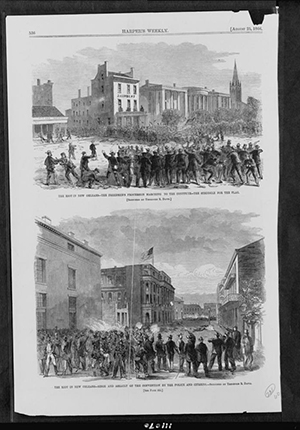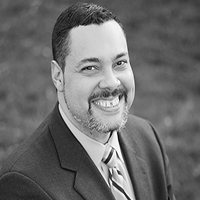Historic Document
Harpers’ Weekly, “The Massacre in New Orleans,” (1866)
Harpers’ Weekly | August 18, 1866

Library of Congress, Prints and Photographs Division
Summary
On July 30, 1866, a mob of ex-Confederates led an armed attack on a group of Louisiana Republicans and their African American supporters as they convened in the Mechanics Institute Building in New Orleans. Republicans had called the convention to enfranchise African Americans and to draft a new state constitution. Angered by the effort, ex-Confederate rioters, joined by local New Orleans police, first encircled the building, then stormed it, stabbing and shooting the convention delegates as they fled or jumped from windows in desperation. Official reports say that 38 were killed and 146 wounded. Congressional investigators described the events as a “work of massacre…pursued with a cowardly ferocity unsurpassed in the annals of crime.” The massacre in New Orleans, combined with similar violence in Memphis, Tennessee, and Norfolk, Virginia, underscored the failure of President Andrew Johnson’s more conciliatory plan for reconstruction and led to the empowerment of a group of Republicans dedicated to a more aggressive program in the South and ultimately led to the impeachment of Johnson by the U.S. House of Representatives.
Selected by

Allen C. Guelzo
Director, Initiative on Politics and Statesmanship, James Madison Program in American Ideals and Institutions, Princeton University

Darrell A.H. Miller
Melvin G. Shimm Professor of Law at Duke University School of Law
Document Excerpt
The late tragedy in New Orleans, terrible as it was, will be of the most salutary effect…. For five and six years past slavery has exiled, tortured, hung, and burned Southern men for fidelity to the Union. But the sure mills of God grind slowly on, and slavery is abolished.
We have entered upon a new era. Already men are shot by stealth in the late slave States because they declare justice to be the best policy. Already school-houses are burned and teachers hunted away because they seek to enlighten the minds which slavery had darkened…. In Memphis hatred of the principle of equal rights before the law massacres the most friendless and unfortunate part of the population; and in New Orleans the advocates of the same principle, meeting to discuss the subject, are ferociously murdered. But still the slow mills of God grind on. The seed of equal rights will be watered, not drowned, by the blood of the sowers. It will surely grow into a harvest which no storm can destroy….
The President knew, as every body else knew, the inflamed condition of the city of New Orleans. He had read, as we had all read, the fiery speeches of both parties. He knew, unless he had chosen willfully to ignore, the smothered hatred of the late rebels toward the Union men of every color. He may have considered the “Conservatives” wise, humane, and peaceful. He may have thought the Radicals wild and foolish. He knew that the Mayor was a bitter rebel, whom he had pardoned into office. He knew that the courts had denounced the Convention, and he was expressly informed that they meant to indict the members. He could not affect ignorance of the imminent danger of rioting and bloodshed….
If, however, he had any right whatever to intervene in the absence of a demand from the Legislature or the Governor, it was derived from the fact that Louisiana is held by the military power of the United States…. And he knew, as he knew his own existence, that a simple word to the military commander to preserve the peace at all hazards would prevent disorder and save lives. He did not speak that word. Assuming to plant himself upon the Constitution, which by his very act he violated, he telegraphed to the Attorney-General of the State. He threw his whole weight upon the side of those from whom he knew in the nature of things the disorder would proceed, and from whom it did proceed. He knew the city was tinder, and he threw in a spark. Every negro hater and every disloyal ruffian knew from the President’s dispatch that the right of the citizens to assemble and declare their views would not be protected….
And the mob so understood it. A procession of negroes carrying a United States flag was attacked. It defended itself; and the work which one word from the President would have stopped, and which he had the full authority to speak if he could speak at all, went on to its awful result. The rebel flag was again unfurled. The men who had bravely resisted it for four years were murdered under its encouragement….
…Surveying the Executive action of eighteen months, with its plain tendencies and apparent inspiration…has left the President with no other party than the most vehement of the late rebels at the South, the Copperheads at the North, and the timid and trimming adherents of the Union party, while the great mass of sturdy Unionists in all parts of the country at the North and South still maintain the ground they have always held….




